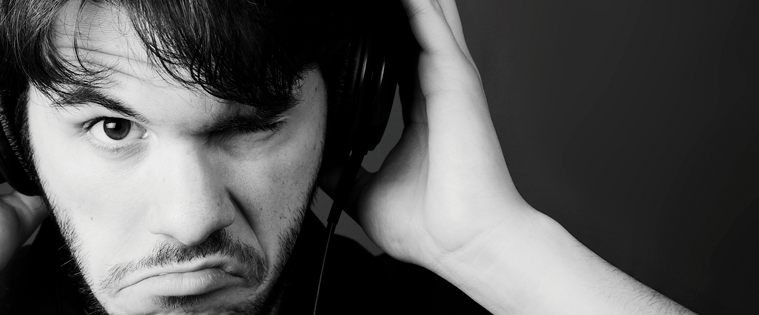Understanding the Non-Neutrality of Music
Way back when rap music was beginning to garner more mainstream appeal and radio play, I was a really, really white guy. Okay, I’m still a really, really white guy—can’t seem to do much about that since too much sunshine just makes me a really, really pink guy. Sigh. I digress.
Way back in those days I was teenager. And, as hip hop started to become popular even a white guy like me from small-town Ontario got the groove. During one of my teenage summers I worked one of those jobs that make you keenly aware of what you’re never going to do for a living. As I repeated the same thing day after day in the sweltering July humidity I listened to FM radio play some of those first great rap songs. I particularly enjoyed “Let Your Backbone Slide” by Maestro Fresh-Wes. I wasn’t quite sure what letting my backbone slide was all about, but was fairly certain it wasn’t about stealing second base. Regardless, I was learning to love something new which greatly enhanced the musical repertoire I had grown up with—mostly the bluegrass gospel music and country music of my parents.
So, now, if I happen to hear that tune, or others from that era—“Can’t Touch This!”—guess where I’m transported? No, it’s not to some breakdance posse I joined; I’m way too uncoordinated for that! Rather, it’s to that tedious summer job with the pungent industrial smells and long hot days with a crackling radio. Oh, and I’m also taken back to one other memory: my new friend Dave.
Dave was a couple years younger than I when he moved in with my family. He’d been kicked out of his home when he became a follower of Jesus and moved from the big city to my small town. He was another addition to our family that had a habit of taking in strays and misfits. I’m an only child, but on three different occasions my parents opened their home to young men needing a place to call home. Dave was the last of these, and he came by my invitation, so clearly I picked up the family habit. I had been growing in my own renewed faith and I saw Dave as a younger brother in Christ whom I could disciple and influence. Perhaps, as I reflect now, he was too much of a project in my eyes and I didn’t love him enough. Turns out, I think he helped my following of Jesus more than I helped him, and it is here that Maestro Fresh-Wes slides back into the story.
Dave was more street-smart than I. Given the brokenness of his journey as a young man he was, as I have learned more fully over the years from those who share similar paths, quite gifted in smelling what was fake… or as we knew it where I grew up: manure (among other descriptors). So, one day—and I can remember where I was standing— he helped me see where the songs I was listening to were taking him: backwards. You see, it turned out that he was watching my life more than I thought, and Maestro’s hits coming from my lips and his new spiritual shift were unhelpfully colliding. I was, in effect, stepping on my younger brother’s faith and pulling him back into a world that he had been finding freedom from. It wasn’t Maestro who was wrong; it was me.
Now, I hope you’re getting the point. At issue here is not the lyrics or morality of an artist. People sing about all kinds of stuff, hung on various beats, that simply is the stuff of life—including sex, violence, and a good party. Even the scriptures melodize or lyricize these things (trying reading Song of Songs to your ten-year-old, or check out Nehemiah 8:9-10 where the people of Israel are told to stop weeping about their sins and go have a party). What you hear on the radio and read in Scripture is often not that far apart if you listen for the heart of the matter. Scripture often normalizes and agrees with what a rapper is angry about or a banjo twangs about and uncovers the God story at the root of what we experience pleasurably or painfully and points to redemption and restoration in Christ as the hope we’re all crooning for. So, at the heart of our interaction with music is discernment about where a song takes me, and by extension, where it takes my brother or sister.
You see, in my case, Maestro Fresh- Wes took me to a new genre, but it took Dave somewhere else: back to a life he didn’t want anymore and was trying to unlearn. His emerging faith was being taken apart by my musical freedom and I knew in that moment— thank you Holy Spirit!—that Maestro had to go for his sake, and ultimately my own understanding of what it truly means to place another above yourself; including your own personal preferences and freedoms.
So, all these long summers later, this little question remains a helpful discipleship tool when it comes to how I engage musical culture: “Where does that song take me?”
If a song, regardless of the genre or label leads to deeper consideration of the fuller meaning of life, purpose, joy, love, and friendship then it’s taking me to places where the reign of God beckons and the Spirit of truth is free to roam, awaken, and transform. I have discovered this many times in surprising ways. Artists like Mumford and Sons, U2, and Johnny Cash have done this for me along with David Crowder, Needtobreathe, and Steve Bell. I can think of two profound moments in my discipleship journey so far that are marked by music: one through a Christian Rock group, the other through a Disney movie soundtrack of all things (and no, it wasn’t Frozen!). In both cases, the song took me somewhere holy and transforming as the Spirit used the poetry and creativity to turn my thoughts, as the Apostle Paul writes, toward that which was true, noble, right, pure, lovely, admirable, excellent or praiseworthy (Philippians 4:8).
But, we know, not all songs take us to such good places. Some songs, while irritatingly and sometimes sinisterly catchy, take us down dark paths that awaken our dark sides. You can’t attend a sporting event without suddenly tapping your toes to “Raise a Little Hell” only to wonder if that’s really good for the soul, let alone the soul of my son sitting beside me. Other tunes of all styles and genres can awaken lust, greed, anger, dissension and rebellion in us and take us places we ought not go. For some of us that begins to sound too legalistic, but it’s really more about diet and paying attention to what you feed your soul. You know that snack you decided to eat before bed only to regret it at two in the morning? Well, this is that principle applied to your spiritual health: if you know that song and the thoughts, emotions, or temptations it awakens in you is going to give you spiritual heartburn, well, maybe heed the Spirit and the wisdom that says, “Above all else, guard your heart, for everything you do flows from it” (Proverbs 4:23).
Finally, if a song messes with a child or a brother or sister in Christ, then as I learned with my friend Dave, it is right and good to stop the noise. Music is formational. It’s why the Church of Jesus has always sung theology in various forms, why commercials have jingles, revolutions and nations have anthems, and why we have moments in our lives where we say “they’re playing our song.” So, if there’s music that takes someone God has entrusted to my care to unhealthy places then I should discern this carefully, even discuss it communally, and not be afraid to say, “if this causes another to stumble, then I’ll never hit play again.” (paraphrasing 1 Corinthians 8:13). The point, after all, is not law, but love. Do I love that person and their well-being more than I love my freedom and playlist? Where will this song take them? Will it take them backwards if they’re a young disciple? Will it awaken things too soon if they’re a child (Song of Songs 8:4)? Do I love enough to consider all this and set aside my wants?
All this matters. After all, music is a reflection of the image of God in us. We create tunes, make great harmony and even noise. It’s beautiful, miraculous even, but it’s not always neutral. So, learning to ask “Where does that song take you?” can help uncover what we really value and who we really love.
About


